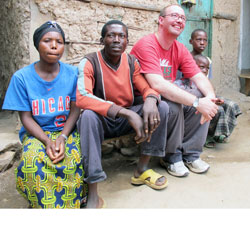This morning brought an e-mail from a former bishop in Rwanda, The Rt. Rev. Venuste Mutiganda, of a marvelous article published today in the New Times of Kigali. The article tells the story of two British diplomats – the High Commissioner to Rwanda, Ben Llewellyn Jones, and the Director of the Department for international Development (DfID), Elizabeth Carriere – who spent three days living with rural families in Rwanda.
Why?
So they could experience “firsthand what it means to live off less than one dollar a day.”

Fortunate Ntawoyangire, left, wife of Theophile Manayiragaba, center, and Ben Llewellyn Jones, right, the UK High Commissioner, sharing a light moment with his hosts. (By D Umutesi of the New Times of Kigali)
The article, found here, explores how these two high-ranking diplomats got to know the people, and what their lives are like, first-hand.
This was no “grin-and-grip” visit, whereby the officials showed up in big cars, looked around, shook some hands, hand their photos take and then left.
This was life – real life – experienced at its most basic. Llewellyn Jones, the High Commissioner, got up at 5 in the morning and tilled a field with a hoe and then planted some beans. Carriere, the Director of DfiD, stayed with two sisters whose parents were killed in the 1994 genocide.
The visits were arranged and facilitated by ActionAid Rwanda, an NGO that is a “country programme of ActionAid International (AAI) – an anti-poverty agency working with poor and voiceless people and communities and with like-minded partners worldwide. ActionAid is a non-partisan, non-religious development organisation that has been working in Rwanda as a full country programme since 1997 to eradicate poverty and injustices with focus on tackling the root causes of poverty rather than just meeting people’s immediate needs.”
In other words, in order to lift people out of poverty through charity alone, ActionAid works on helping people lift themselves out of poverty.
One way to get out the message: Getting high-level diplomats, many of whom have never quite experienced deep poverty, to go live among the people, and develop relationships with them, at the most basic level.
We are all called to do this: to development relationships at the most basic level. To live together, to eat together, to work together, to struggle – together. When we do so, we no longer look at people as “other.” When we have shared a small space, tilled the land by hand, gathered water and lived in extreme poverty – when we have done that personally – we no longer see the world as “us” and “them.”
Then, we see the world as “us.”
When the visit was over, Carriere and her host both “cried uncontrollably.”
A new relationship was born, a relationship based in our common lives together.
This is what mission is all about, folks. It’s not about “saving” people, or simply handing out our treasures. It’s about relating to each other as God relates to us – in love.
Living with the poor – as they live, experiencing their lives every day – takes us outside of our own lives, our own perceptions (and misperceptions) and helps us to see all people as God’s beloved. Far too often, we see the extreme poverty of the world, we see people – from a distance – who have so little, and we throw up our hands and say, “Well, the poor we’ll always have with us.” Or we wonder, sometimes aloud, sometimes right in front of those poor people, why they haven’t done more to help themselves.
But living in poverty is not a sin.
Poverty itself is the sin.
Not for those who experience it, but for those of us who have enough and allow others to not have enough. That’s the sin.
Will these little visits change everything overnight in Rwanda? Nope.
But will they help two high-ranking British diplomats view the world differently? Most likely.
Relationships do that to you. They change you.
These relationships, this change, has all the hallmarks of the good mission into which God calls each of us.




